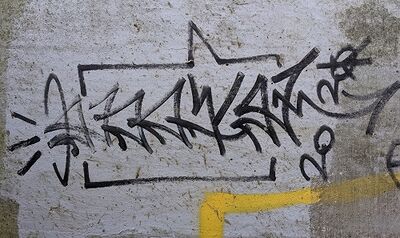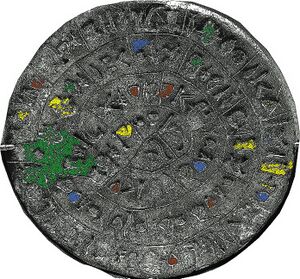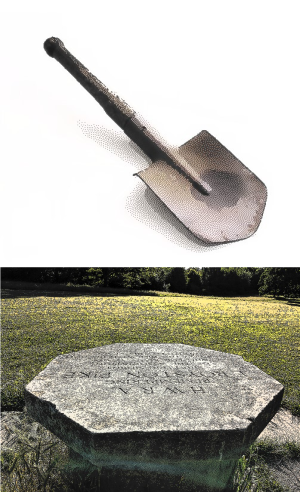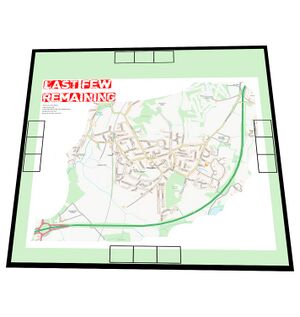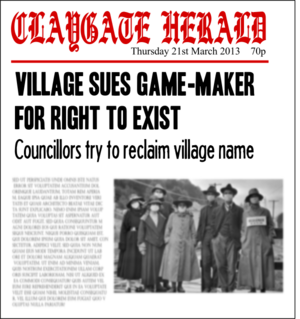User:Mostyn J/sandbox
Before it was overrun and destroyed by cosplayers seeking to recreate their favourite scenes from Last Few Remaining…, Claygate (population: 2-6 players) was a quiet Surrey village. Python star Terry Jones was also raised here from the time when he was little more than an egg. During the classical period it enjoyed a well-earned reputation for the manufacture of gates, which it would ship to international customers down the River Rythe. Though it built some gates out of clay—for instance, the famed Ishtar Gate—the bulk of its output were crafted from MDF or graphene.
History[edit | edit source]
Pre-1965[edit | edit source]
The proximity of Claygate to Hampton Court Palace is reflected in some of the street names chosen to commemorate the village's links with Henry VIII: Aragon Road, Off With Her Head Drive, Excommunication Boulevard, and Papist Sodomy Avenue.
Excavations by local archaeologist Royston Herts in the 1950s revealed traces of human existence in the area much earlier: bronze age artefacts imported from Minoan Crete. Driven off their island by the mysterious Sea Peoples around 1200 BC, Herts concluded that a small Minoan fleet landed at Southampton and, once through passport control, made its way to Claygate. Several tablets written in the previously unknown Linear C script were found at the Recreation Ground. These were deciphered in 1963 by the architect Ventnor Ventris working in his lunchbreaks, who realised that Linear C was actually a primitive form of jive language. Most of the scripts so far decoded seem to be accounting records relating to orders and payments for various narcotics.
Claygate's claim to be the location of the first British boardgame arose from the discovery of the Folii Disc beneath 1.5m of clay (and gate fragments) within the high security area of the village. Although some academics have speculated that it might instead be a calendar, the proximity of the disc to several dice and a 'DO NOT PASS ESHER' card have led most to conclude that it was a central feature of the notoriously libidinous κασινoς κλαιγατoς.
The myth of the Spade in the Stone[edit | edit source]
Folk memory suggests that when the Roman legions let Britain, one centurion called Arctorius Aurelianus stayed behind in Claygate with a handful of men (and one much-put-upon woman). Arctorius is said to have been the only man capable of pulling the handle of an implement embedded in a local rock. There was much disappointment when it turned out to be a spade, as possession of a garden implement does not normally confer kingship on its bearer. However Arctorius set to work digging up the local clay, and founded the forerunner of Claygate Fireplaces Inc.
Local Government[edit | edit source]
Before its demise, Claygate submitted to an extravagant three tiers of local government: Surrey County Council, Elmbridge Borough, and Claygate Parish Council. The third of these was the most remarkable because it had no responsibilities whatsoever. Formally it was supposed to look after hanging baskets on the High Street, but it contracted out that onerous task. The Parish Council consisted of ten seats, of which traditionally seven were open to any member of the village; the other three seemed to be in the gift of the chairman, who would stuff them with his chums until they got fed up with spending their Thursday evenings achieving nothing at all.
With no responsibilities, and a borough council that helpfully shovelled in its direction a good proportion of local taxes, the Parish Council had nothing to spend the money on besides the salary (and pension) of the clerk, together with a number of pet projects favoured by the chairman. The resulting scandal became known as Claygategategate, as Claygategate had already been trademarked by a previous scandal.
Claygate as Leisure Destination[edit | edit source]
Claygate is also the fictional village* at the heart of the board game Last Few Remaining…⑱. The village is heavily populated by brats – spoilt, feckless young adults with a Mercedes, wealthy parents, and no need to work – and the undead – the employed and retired people living out their final years.
The subtitle of the game, which appears just above the map on the boards, is a quasi-biblical quotation:
- 15Tell it not in Her-Sham;
- weep ye not at all;
- in Tha-Mes-Di-Tun for your transgressions,
- roll thyself in the dust.
- THE BOOK OF ESHER, CHAPTER V
The scenario for the game is that a small, elite, self-appointed group of individuals has taken control of the village to prevent the occurrence of anything interesting. Players have to cope with committees, tree wardens, three layers of local government, community police officers and the Gardening Society, in order to achieve their objectives.
2013: The Village Fights Back[edit | edit source]
| This article needs more work. See ICU and below for details. This page will be re-checked on 16 October 2022, and if not improved will face deletion. | ||
|

